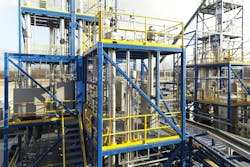Operator unveils plan for Louisiana carbon-negative biofuels complex
Toronto-based Woodland Biofuels Inc. is proposing to build a combined renewable natural gas (RNG) and green hydrogen complex that will produce biofuels from organic waste feedstocks along the Mississippi River at the Port of South Louisiana, in Reserve, St. John the Baptist Parish, La., between New Orleans and Baton Rouge.
To be equipped with carbon capture and storage (CCS), the proposed $1.35-billion project will involve first-phase construction of a carbon-negative RNG plant followed by second-phase construction of an “ultra-green hydrogen” plant, both which upon startup would become the largest of their kind globally, Woodland Biofuels and the Louisiana Economic Development (LED) said on Sept. 17.
To be located at the port’s Globalplex Intermodal Terminal—a 335-acre maritime industrial park operated by Convent, La.-based Associated Terminals—the project’s first phase is targeted for start of commercial operation in 2028 and create 110 direct new jobs, the parties said.
Woodland Biofuels said it expects Phase 1 of the project will permanently remove 210,000 tonnes/year (tpy) of carbon dioxide (CO2) from the ecosystem, with Phase 2 to feature an additional CO2-removal capacity of 660,000 tpy.
Woodland Biofuels—which currently runs an integrated end-to-end biomass-to-biofuel demonstration plant in Sarnia, Ont.—would presumably outfit the proposed Reserve complex with its own production process, which can reduce greenhouse gas emissions by 283% compared to traditional fuel production methods, according to the operator’s website.
Neither Woodland Biofuels nor LED revealed details regarding the Reserve complex’s proposed production capacities for biofuels.
To support project development, LED confirmed offering Woodland Biofuels a competitive incentives package that includes a $10-million performance-based grant for infrastructure improvements, as well as access to solutions of its FastStart state workforce training program and Louisiana’s Industrial Tax Exemption Program (ITEP).
Woodland Biofuels said it values the entirety of LED’s incentive package at more than $250 million.
With a front-end engineering and design (FEED) study for the site scheduled to be finalized by second-quarter 2025, LED said it expects Woodland Biofuels to reach a final investment decision (FID) on the proposed project by yearend 2025.
About the Author
Robert Brelsford
Downstream Editor
Robert Brelsford joined Oil & Gas Journal in October 2013 as downstream technology editor after 8 years as a crude oil price and news reporter on spot crude transactions at the US Gulf Coast, West Coast, Canadian, and Latin American markets. He holds a BA (2000) in English from Rice University and an MS (2003) in education and social policy from Northwestern University.

